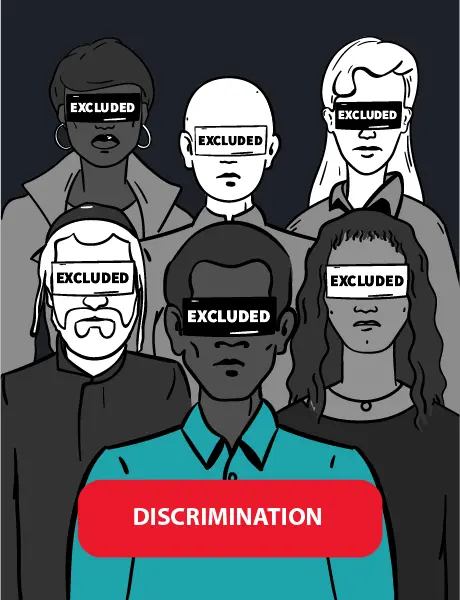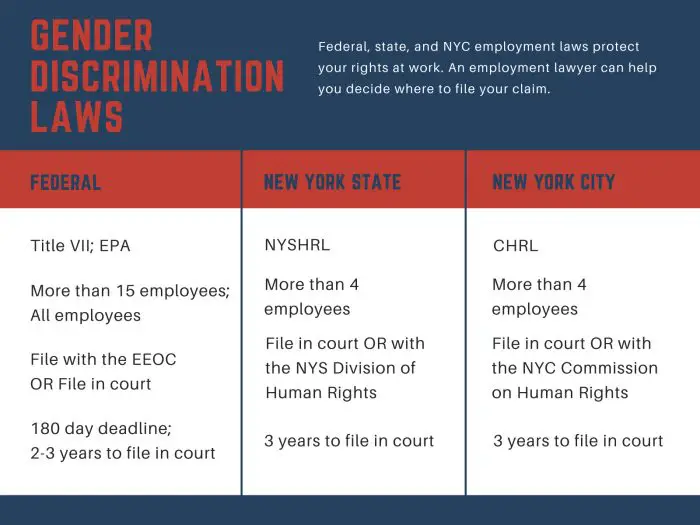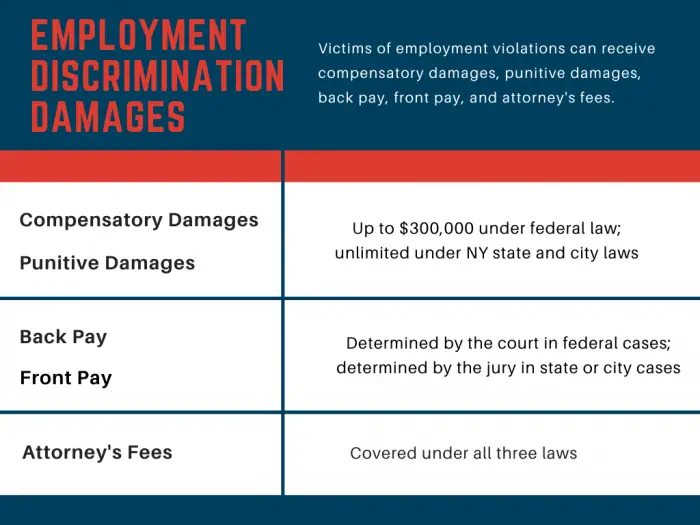Sex and Gender Discrimination In The Workplace
Protect Your Rights with a Gender & Sex Discrimination Lawyer
Have you experienced gender discrimination at work? Gender discrimination violates your rights.
But what counts as gender discrimination? Is there a difference between sex discrimination and gender discrimination? And how can you prove gender discrimination at work?
Our guide walks through your rights under gender discrimination laws and how to protect them. If you experience gender or sex discrimination in the workplace, a discrimination lawyer can help.
Contact New York discrimination lawyer Charles Joseph for a free consultation to protect your rights. Charles Joseph’s firm has recovered more than $140 million for clients. Reach out today for a free, confidential consultation.

Know Your Rights: What is Gender Discrimination?
Gender discrimination means treating an employee poorly because of their sex or gender. This can include not hiring a candidate because of their gender, paying employees less based on gender, or firing candidates because of their gender identity.
It is illegal for an employer to make employment decisions based on your gender.
Employers cannot make employment decisions based on your gender instead of your skills or how well you do your job. This includes decisions about hiring, firing, discipline, distribution of benefits, promotion, compensation, job training, or any other condition of employment.
Men can be the victims of gender discrimination.
Anyone, including men, can be harmed by gender and sex discrimination. If you have been the victim of gender discrimination in the workplace, you are protected under federal, state, and New York City gender discrimination laws.
New York gender discrimination laws cover non-employees.
The law does not just protect employees. After October 11, 2019, New York State’s discrimination laws expanded to cover non-employees, such as domestic workers, independent contractors, consultants, vendors, and subcontractors.
A gender discrimination lawyer can determine whether you qualify under state laws.
Examples of Gender Discrimination in the Workplace
Gender discrimination can take many forms. New York City’s law is broader than state or federal law, meaning it is easier to prove gender or sex discrimination.
If you have been treated less well than other employees because of your gender, you may have a claim for gender discrimination.
Gender-Based Employment Decisions are Illegal
Making employment decisions – including hiring and firing – based on gender or gender stereotypes violates the law.
Examples of gender discrimination in the workplace:
- You apply for a job for which you have experience and excellent qualifications, but the hiring manager does not hire you because some of the company’s long-time clients are not comfortable dealing with a woman in that position.
- The company lays you and several other female coworkers off, blaming cutbacks and reorganization. However, male employees with the same job and less seniority keep their jobs.
- You apply for a job as a welder. After you are hired, the company’s owner fires you because all the other welders are men and he does not think a woman would “fit in.”
Discriminatory Promotion Decisions Violate The Law
Laws against gender and sex discrimination also protect employees from not receiving promotions, including tenure, because of gender or gender stereotypes.
Examples of gender discrimination in the workplace:
- You have worked for your company for several years, receiving exemplary reviews and an employee-of-the-year award. But every time you apply for a promotion, the position is filled by a less qualified male employee.
- After working as a low-level manager at a company for years with excellent performance reviews, you still have not been promoted. Your responsibilities have increased over time, but your job classification and salary do not reflect this. Meanwhile, male colleagues have been promoted to mid and upper-level management to reflect their increased responsibilities.
- You are a school psychologist on a three-year tenure track. You have always received excellent performance evaluations, including after you returned from your recent maternity leave. However, as your tenure review draws near, your boss questions whether you can put in the necessary hours at work because you are a mother. You are denied tenure.
Gender-Based Differences in Pay are Illegal
Under the EPA, men and women must receive equal pay for equal work in the same establishment. The jobs do not need to be identical, but they have to require substantially equal skill, effort, and responsibility. The jobs also have to be performed under similar working conditions within the same establishment.
Two people with different job titles may have substantially equal jobs based on the tasks they perform.
The law protects you against gender-based differences in any form of compensation, including salary, overtime pay, bonuses, stock options, profit sharing, life insurance, and vacation or holiday pay.
Examples of gender discrimination in the workplace:
- You worked your way up to the position of regional manager. The company recently hired a male regional manager with similar training and work experience, and you learn that he will be paid more than you.
- Your company’s health insurance policy does not cover your husband, because the company assumes that he will have his own benefits. However, your male coworkers’ wives are all covered by the policy.
- You are a top salesperson for your company, but your employer reassigns you to a less desirable territory. At the same time, a male employee with lower sales is given your territory and client base, enabling him to make much more in commissions than you.
- You work as a salesperson at a high-end retail store that sells men’s clothing. The male sales staff receives a $12,000 per year clothing allowance. The female employees do not. This may violate the Equal Pay Act.
- A school district hires both cleaners and custodians to take care of the school buildings. Cleaners and custodians perform the same job duties, but custodians are paid higher wages than cleaners. All the cleaners are women, and all the custodians are men. The district justifies the higher custodian wages by arguing that custodians must take the civil service exam. Since both positions perform the same job tasks, the fact that custodians have to take the civil service exam does not justify paying them more.
Paying some employees less may qualify as wage discrimination. A gender discrimination lawyer can help determine whether you have a case.
Gender Stereotypes and Discrimination
Employers cannot treat you unfavorably because of stereotypes associated with gender.
The law prohibits employment decisions based on stereotypes and assumptions about the abilities and traits of different genders.
Examples of gender stereotypes and discrimination:
- A woman applies for a sales job. She has professional experience and excellent qualifications, but a man is hired instead because the employer assumes men are better able to employ aggressive sales tactics.
- The desk clerk at a hotel is a woman. Her supervisor will not allow her to work the higher-paid night shift because he believes it is not appropriate for women to work late at night.
- A man applies for a job as a childcare worker. He has ten years of experience and positive referrals, but a woman is hired instead because the employer assumes that women are better caretakers.
- When a female employee applies for a promotion, her boss says she is “too macho” because she has short hair and wears pantsuits. While this qualifies as discrimination, your employer may be allowed to enforce a dress code that says men must wear ties and women must wear dresses or skirts.
- Women at a restaurant are required to wear sexually revealing uniforms, but male co-workers in the same position are allowed to wear much more conservative outfits.
Employers cannot excuse discriminatory decisions because of the anticipated reactions of other employees or customers.
It is illegal for employers to blame gender discrimination on business concerns. This includes the anticipated response of coworkers and the negative reaction of clients or customers.
Discriminatory Policies
Unintentional gender discrimination can also be illegal.
Job policies that appear neutral can be discriminatory if they disproportionately harm workers of one particular gender in cases where the policy is not job-related.
For example, an apparently neutral policy that requires all fire department applicants to be at least 5’8” disproportionately excludes women, and may be discriminatory unless the fire department can show that the height requirement is rationally related to job performance.
Gender discrimination can occur when the victim and the perpetrator are of the same gender.
Contact a sex and gender discrimination lawyer to learn whether you have a case.
Hostile Work Environments
You can be the victim of gender or sex discrimination even when no employment decision is involved if gender-based harassment has created a hostile work environment.
A hostile work environment can be created by jokes, slurs, or offensive or derogatory remarks about a particular gender.
If your boss is mean to everyone, or if they’re harsh with you because they dislike you for personal reasons, civil rights laws do not apply. There is no legal requirement that workers be treated with civility, kindness, or even respect.
Hostile Conduct Must Be More than Trivial or Petty
New York City has a generous standard for a hostile work environment, which is defined as being treated less well than others because of your gender as long as the poor treatment amounts to more than a “petty slight” or “trivial inconvenience.”
New York State recently changed its standard so that after October 11, 2019, discriminatory harassment is unlawful when it “subjects an individual to inferior terms, conditions or privileges of employment.”
Federal law has the strictest standard, which requires that the conduct be either severe or pervasive.
It is important to speak up when you witness offensive conduct to make it clear that such comments are unacceptable and unwelcome.
Victims Do Not Have To Be The Targets
Anyone can be the victim of a hostile workplace. You can be a victim even if you are not the person being targeted by offensive behavior. Men can also be the victims of hostile comments about women.
If the offensive behavior is affecting your ability to do your job, you may have a claim.
The Offender Does Not Have To Be Your Boss
Your boss isn’t the only one who can create a hostile workplace. Employers have a responsibility to prevent gender discrimination, including stopping their employees from making hostile comments.
While employers are generally liable for a supervisor’s behavior, they are also liable for the behavior of employees who are not in a position of authority over the victim if there have been complaints about the perpetrator or the perpetrator has committed acts against others. If the company knew or should have known about the discrimination, they may be liable.
A co-worker, a supervisor in another area of the company, or even a non-employee, like a vendor, can be the perpetrator.
How to Prove Discrimination in the Workplace
Gender and sex discrimination can happen in any workplace. If you experience gender discrimination or a hostile work environment, there are several steps you can take right away to help prove your case.
Make it clear that the behavior is unwelcome and keep records to prove that you did.
- Start keeping notes of discriminatory comments or actions. Be specific in your details—write down the time and place of each incident, what was said and done, and who witnessed the actions.
- Keep doing a good job. Make copies of your job evaluations and any letters or memos that show that you are doing a good job at work.
- Seek support from friends and family, clergy, and, if helpful, a mental health professional. Harassment at work can be very stressful, and it is a difficult thing to face alone.
- Report the incident in writing to your supervisor and human resources department. Tell them about the behavior and the steps you have taken to address it.
- Check your company’s employee handbook. If your employer has a harassment policy in place, follow it.
- Preserve any information such as inappropriate texts, pictures, or voicemails sent to you.
- Put all of your complaints in writing, and keep copies at home.
A gender and sex discrimination lawyer can help prove your case. Reach out to New York gender discrimination lawyer Charles Joseph for a free consultation if you live in the greater NYC area.
Legal Protection Against Retaliation
If you complain about gender discrimination, it is illegal for your employer to take any action against you.
It is illegal for employers to retaliate against applicants or employees who complain about discrimination on the job, file a charge with the Equal Employment Opportunity Commission (EEOC) or any state or city agency, or participate – including being a witness – in an employment discrimination proceeding, such as an investigation or lawsuit.
You Are Protected From Retaliation Even If There Was No Discrimination
As long as you had a good faith and reasonable belief that discrimination or harassment occurred, your employer is barred from taking any action against you for speaking out or participating in any investigation or proceeding. It does not matter if an agency or court later determines that there was no discrimination.
If you speak out about discrimination and harassment in your workplace, the law protects you from retaliation.
How To File A Claim
If you choose to file a claim for gender discrimination, you have several options. You can file a complaint with the U.S. Equal Employment Opportunity Commission (EEOC), which handles violations of federal law. The New York State Division of Human Rights handles NYSHRL violations, and the New York City Commission on Human Rights is responsible for CHRL violations.
If your claim falls under multiple gender discrimination laws, as it usually will, the three agencies that handle discrimination claims have what is called a “work-sharing agreement,” which means they cooperate with each other to process your claims. There is no need to file a claim with each agency. You simply need to indicate that you want your claim “cross-filed” with the other agencies.
Learn how to file a discrimination claim, how to file an EEOC complaint, or contact a sex discrimination lawyer for help.
Comparing Gender Discrimination Laws
In New York City, a gender and sex discrimination lawyer can file your claim under federal, New York state, and New York City gender discrimination laws.
Remedies for Gender Discrimination
Because workplace discrimination is a serious crime, gender discrimination laws penalize employers with damages and fines. A New York sex discrimination lawyer can get damages, back pay, and fines for victims of gender or sex discrimination.
- Back Pay: Back pay is the money you would have earned if not for gender discrimination, including wages, benefits, bonuses, and more.
- Reinstatement: If your employer fired you because of gender discrimination, the courts can order your company to give you back your job. They can also order employers to grant promotions.
- Front Pay: Front pay helps victims of gender discrimination return to their prior level of compensation. Courts calculate the lost wages and benefits owed as front pay.
- Compensatory Damages: Compensatory damages cover out-of-pocket expenses caused by gender discrimination. This can include lost wages due to missed work, the cost of therapy, and job search costs. It can also cover emotional pain and suffering.
- Punitive Damages: Punitive damages punish employers for their role in gender discrimination. Under New York City law, courts can order punitive damages if an employer shows negligence, recklessness, or a conscious disregard of an employee’s rights.
- Liquidated Damages: Under the EPA, victims of gender discrimination can receive liquidated damages. The amount is equal to the court-ordered back pay.
- Attorneys’ Fees and Costs: The court can order employers to pay victims of gender discrimination for their attorney fees, witness fees, and court costs.
Potential Damages In A Gender Discrimination Lawsuit
During a gender discrimination lawsuit, you can also receive emotional distress damages. Contact a workplace discrimination lawyer for more information.
A gender discrimination lawyer can help protect your rights. Reach out to Charles Joseph, a discrimination lawyer, for a free, confidential consultation today.


